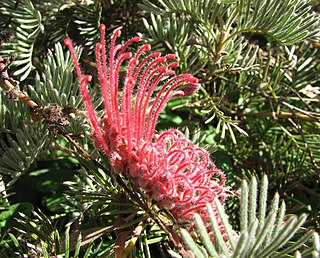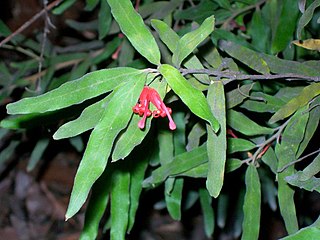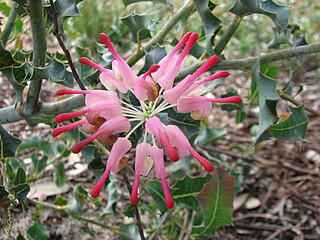
Grevillea preissii is a species of flowering plant in the family Proteaceae and is endemic to the southwest of Western Australia. It is a mounded to spreading or dense, erect shrub, the leaves divided with 5 to 7 linear to more or less cylindrical lobes, and groups of reddish flowers arranged along one side of the flowering rachis.

Grevillea thyrsoides is a species of flowering plant in the family Proteaceae, and is endemic to the southwest of Western Australia. It is a small, spreading or low-lying shrub, with pinnatisect to comb-like leaves, the end lobes linear, and clusters of hairy pinkish-red flowers.

Grevillea corrugata is a species of flowering plant in the family Proteaceae and is endemic to a restricted area in the south-west of Western Australia. It is a dense shrub with deeply divided leaves usually with three to five sharply-pointed, linear lobes, and white to cream-coloured flowers.

Grevillea mollis, commonly known as soft grevillea, is a species of flowering plant in the family Proteaceae and is endemic to a restricted area of north-eastern New South Wales. It is an open, spreading shrub with oblong to elliptic leaves and loose clusters of bright scarlet red flowers.

Grevillea plurijuga is a species of flowering plant in the family Proteaceae and is endemic to southern Western Australia. It is a prostrate to low-lying or dense mounded to erect shrub with divided leaves with linear lobes and loose clusters of hairy, red or pink flowers.

Grevillea dryandroides, commonly known as phalanx grevillea, is a species of flowering plant in the family Proteaceae and is endemic to the south-west of Western Australia. A diffuse, clumping shrub, it often forms suckers and has divided leaves with up to 35 pairs of leaflets, and groups of red to pinkish flowers on an unusually long, trailing peduncle.

Grevillea althoferorum, commonly known as the split-leaved grevillea, is a species of flowering plant in the family Proteaceae and is endemic to a restricted area of Western Australia. It is a compact, rounded shrub with sharply-pointed, deeply lobed leaves and dull yellow flowers with a creamy-yellow style.

Grevillea insignis, commonly known as wax grevillea, is a species of flowering plant in the family Proteaceae and is endemic to the south-west of Western Australia. It is an erect, bushy shrub with more or less oblong leaves with seven to seventeen sharply-pointed, triangular teeth, and more or less spherical or cylindrical clusters of cream-coloured flowers ageing to pink.

Grevillea refracta, commonly known as silver-leaf grevillea, is a species of plant in the protea family and is native to northern Australia. It is a tree or shrub usually with pinnatipartite leaves and red and yellow flowers arranged on a branched, downcurved raceme.
Grevillea rhizomatosa, commonly known as Gibraltar grevillea, is a species of flowering plant in the family Proteaceae and is endemic to a restricted area of north-eastern New South Wales. It is a spreading, bushy shrub with egg-shaped to almost round leaves and small clusters of green and pinkish-red flowers.

Grevillea quadricauda, commonly known as four-tailed grevillea, is a species of flowering plant in the family Proteaceae and is endemic to eastern Australia. It is an erect, dense, bushy shrub with narrowly egg-shaped to elliptic leaves and small, loose clusters of green and pinkish-red flowers.

Grevillea masonii, commonly known as Mason's grevillea, is a species of flowering plant in the family Proteaceae and is endemic to a restricted area of New South Wales. It is a low-growing shrub with egg-shaped to elliptic leaves, and red and green flowers with a green style.

Grevillea bracteosa, also known as bracted grevillea, is a species of flowering plant in the family Proteaceae and is endemic to the south-west of Western Australia. It is an erect to spreading shrub usually with linear leaves, and oval to more or less spherical clusters of glabrous pale green to greenish-pink flowers with a pink or white style.

Grevillea coccinea is a species of flowering plant in the family Proteaceae and is endemic to the south of Western Australia. It is a low-lying or sprawling shrub with narrowly wedge-shaped to linear leaves and white, cream-coloured, and red or yellow flowers.
Grevillea dolichopoda is a species of flowering plant in the family Proteaceae and is endemic to the south-west of Western Australia. It is a low-lying shrub with linear to more or less cylindrical leaves and groups up to four red and orange flowers with a red, green-tipped style.

Grevillea haplantha is a species of flowering plant in the family Proteaceae and is endemic to the south-west of Western Australia. It is a dense, rounded shrub with linear leaves and clusters of pink to red flowers with white or brown hairs, depending on subspecies.

Grevillea hislopii is a species of flowering plant in the family Proteaceae and is endemic to a restricted area of the south-west of Western Australia. It is a dense, single-stemmed shrub with linear to narrow elliptic leaves and clusters of hairy, whitish-grey flowers.
Grevillea nivea is a species of flowering plant in the family Proteaceae and is endemic to the south of Western Australia. It is a dense shrub with spreading to ascending branches, crowded, divided leaves, the end lobes linear, and dense clusters of red flowers.
Grevillea prominens is a species of flowering plant in the family Proteaceae and is endemic to a restricted part of the South West region of Western Australia. It is a shrub with divided leaves, the end-lobes linear to narrow triangular, and creamy-white flowers usually projected beyond the foliage.

Grevillea neodissecta is a species of flowering plant in the family Proteaceae and is endemic to Western Australia. It is low, dense shrub with deeply divided leaves, the end lobes linear and sharply pointed, and small clusters of rose pink and white to cream-coloured flowers with a pinkish-red style.

















